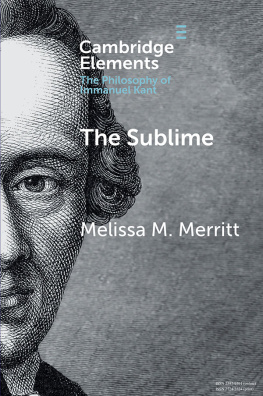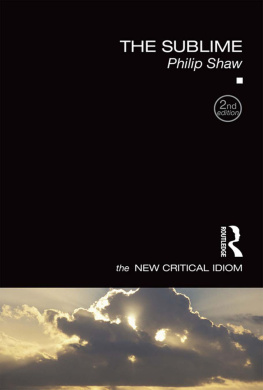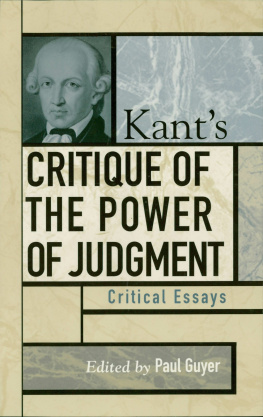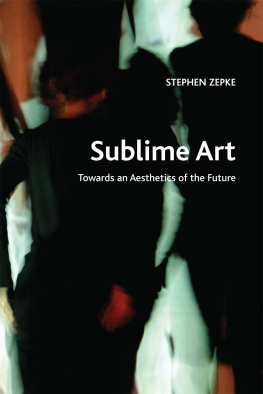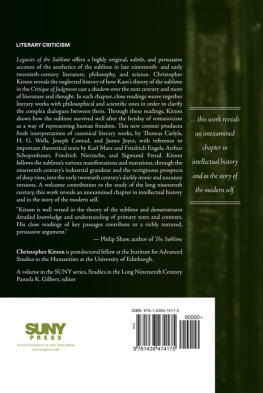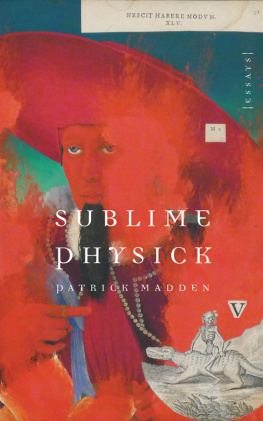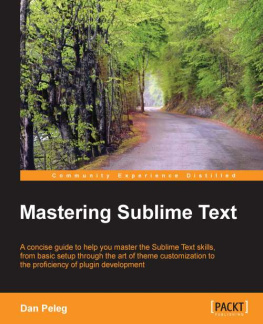The Philosophy of Immanuel Kant
edited by
Desmond Hogan
Princeton University
Howard Williams
University of Cardiff
Allen Wood
Indiana University, Bloomington
The Sublime
Melissa M. Merritt
University of New South Wales
University Printing House, Cambridge CB2 8BS, United Kingdom
One Liberty Plaza, 20th Floor, New York, NY 10006, USA
477 Williamstown Road, Port Melbourne, VIC 3207, Australia
314321, 3rd Floor, Plot 3, Splendor Forum, Jasola District Centre, New Delhi 110025, India
79 Anson Road, #06-04/06, Singapore 079906
Cambridge University Press is part of the University of Cambridge.
It furthers the Universitys mission by disseminating knowledge in the pursuit of education, learning, and research at the highest international levels of excellence.
www.cambridge.org
Information on this title: www.cambridge.org/9781108438704
DOI: 10.1017/9781108529709
Melissa McBay Merritt 2018
This publication is in copyright. Subject to statutory exception and to the provisions of relevant collective licensing agreements, no reproduction of any part may take place without the written permission of Cambridge University Press.
First published 2018
A catalogue record for this publication is available from the British Library.
ISBN 978-1-108-43870-4 Paperback
ISSN 2397-9461 (online)
ISSN 2514-3824 (print)
Cambridge University Press has no responsibility for the persistence or accuracy of URLs for external or third-party internet websites referred to in this publication and does not guarantee that any content on such websites is, or will remain, accurate or appropriate.
The Sublime
Melissa M. Merritt
Abstract:
The Element considers Kants account of the sublime in the context of his predecessors in both the Anglophone and the German rationalist traditions. Since Kant says with evident endorsement that we call sublime that which is absolutely great ( Critique of the Power of Judgment , 5:248) and nothing in nature can in fact be absolutely great (it can only figure as such, in certain presentations), Kant concludes that strictly speaking what is sublime can only be the human calling ( Bestimmung ) to perfect our rational capacity according to the standard of virtue that is thought through the moral law. The Element takes account of the difference between respect and admiration as the two main varieties of sublime feeling, and concludes by considering the role of Stoicism in Kants account of the sublime, particularly through the channel of Seneca.
I took a walk the other morning, which I believe you would have admitted to be in the true sublime. I rambled till I got to the top of a hill, from whence I surveyed a vast extent of variegated country all round me, and the immense ocean beneath. I enjoyed this magnificent spectacle in all the freedom of absolute solitude. Not a house, or a human creature was within my view, nor a sound to be heard but the voice of the elements, the whistling winds, and rolling tide. I found myself deeply awed, and struck by this situation. The first impression it gave me was a sense of my own littleness, and I seemed shrinking to nothing in the midst of the stupendous objects by which I was surrounded. But I soon grew more important by the recollection that nothing which my eyes could survey, was of equal dignity with the human mind, at once the theatre and spectator of the wonders of Omnipotence. How vast are the capacities of the soul, and how little and contemptible its aims and pursuits? The view of great and astonishing objects is sometimes very useful, and gives a noble extension to the powers of the mind; but for wise ends, it is not formed to dwell long upon them, without a weariness that brings it back to its duties in the ordinary affairs of the world, and to common business and amusement. And so after all the elevation of the thoughts from a view of the sublime and stupendous objects of nature, one is very glad to return to enjoyments of a gentler kind, the song of linnets, and the bloom of roses.
Elizabeth Carter (poet, classicist, translator of Epictetus, and bluestocking) to Elizabeth Montagu, 2 July 1762
Prologue
So much was written about the sublime from the turn of the eighteenth century to Kants 1790 Critique of the Power of Judgment , that it can seem as if every self-respecting philosopher and literary intellectual felt compelled to weigh in at some point, with at least passing remarks on the subject though not very often with great technical precision, or searching consideration of the wider philosophical and systematic implications of the concept. Writers resorted to what starts to seem like a stock set of examples, drawing as much from travelogues and literary tradition as from personal experience invoking, with considerable regularity, the sublimity of raging seas, expansive deserts, the Alps, the starry night sky, Genesis 1.3, the heroes of Homer, the Pyramids at Giza, and St Peters in Rome. As a result, it is difficult to assess the originality of any early modern author on the sublime; and the sheer volume of writing on the topic defies efforts to trace historical narratives that develop in even increments, along straight and clearly marked paths.
How original is Kants account of the sublime in the end? If we read widely enough, we seem to encounter many bits and pieces of it avant la lettre . And in some sense we do except that Kant was a consummately systematic thinker, and whatever he borrows from tradition inevitably comes to mean something new as it takes its place in his own project. Moreover, the concept of the sublime is broadly germane to the problem that occupied Kant throughout his Critical period and beyond: the epistemic and moral condition of human finitude. Although this problem has everything to do with the peculiar fate of human reason that frames the opening remarks of the 1781 Critique of Pure Reason (Avii), the role of the sublime in Kants effort to speak to this fate only begins to emerge with points of confluence between ethics and aesthetics in his later writings, from the 1788 Critique of Practical Reason onwards.
Ultimately, for Kant, sublimity is the appreciation of absolute greatness from the human standpoint; and since by his lights the only determinate grasp we can have of such greatness is practical , the Kantian sublime has an irrevocably moral source. I make that case in the middle sections of this Element; the framing sections focus (albeit selectively, owing to constraints on space) on the historical context of Kants work on the sublime. Although others have recognised the need to consider Kants aesthetics in historical context, most exclusively consider his relation to the Anglophone tradition; fewer consider the significance of German aesthetic rationalism, and especially Moses Mendelssohn, for the development of Kants theory of the sublime (but consider, more recently, Kants theory in relation to some of the key moves of these earlier modern traditions.

